外研版(2019)必修 第二册Unit 5 On the road Developing ideas&reading公开课课件(共35张PPT)
文档属性
| 名称 | 外研版(2019)必修 第二册Unit 5 On the road Developing ideas&reading公开课课件(共35张PPT) | 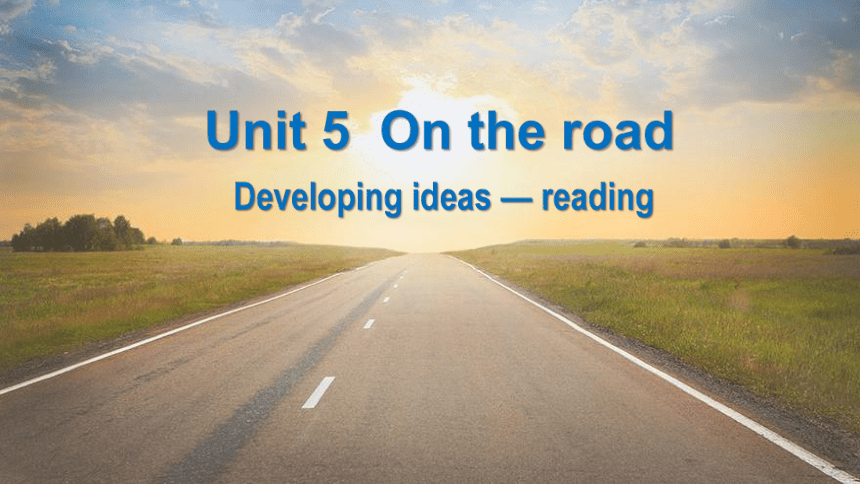 | |
| 格式 | pptx | ||
| 文件大小 | 1.2MB | ||
| 资源类型 | 教案 | ||
| 版本资源 | 外研版(2019) | ||
| 科目 | 英语 | ||
| 更新时间 | 2023-02-27 22:13:45 | ||
图片预览

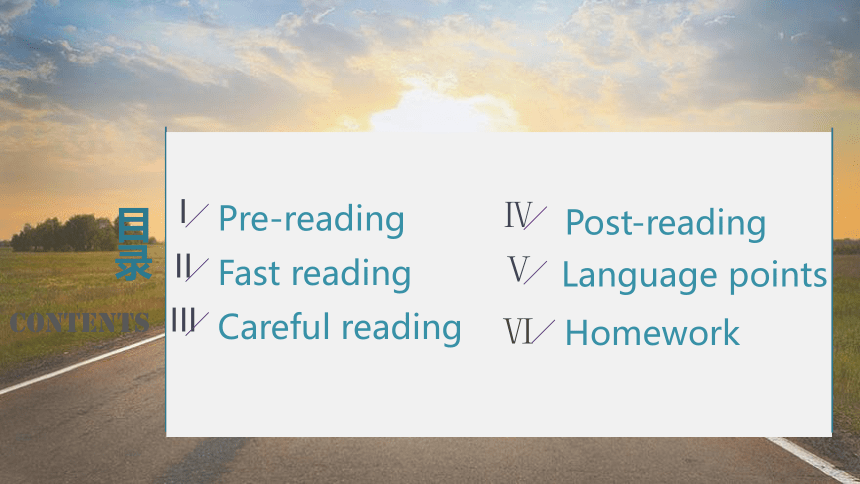

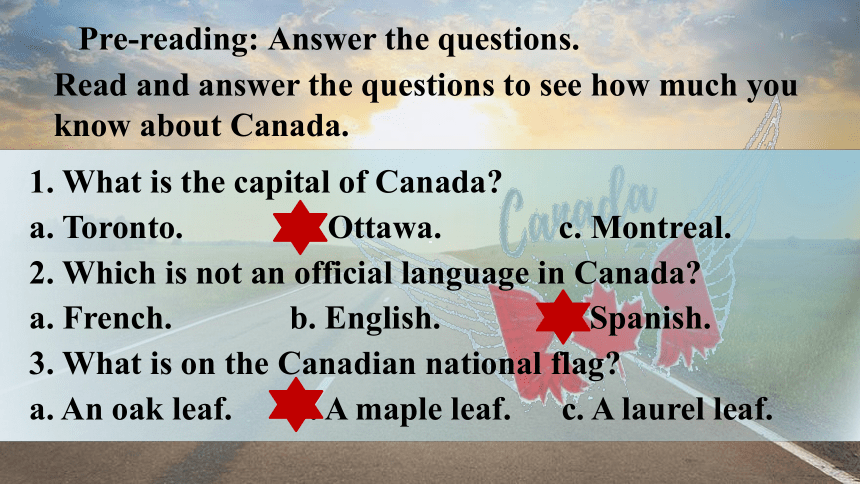
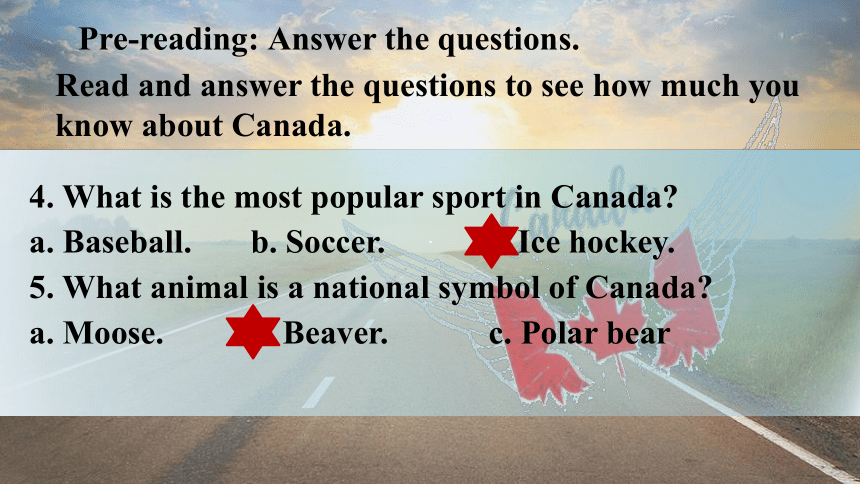
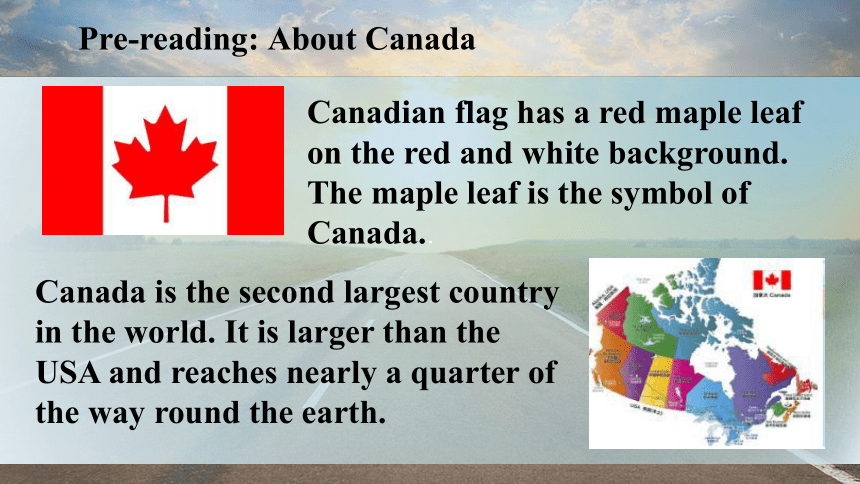
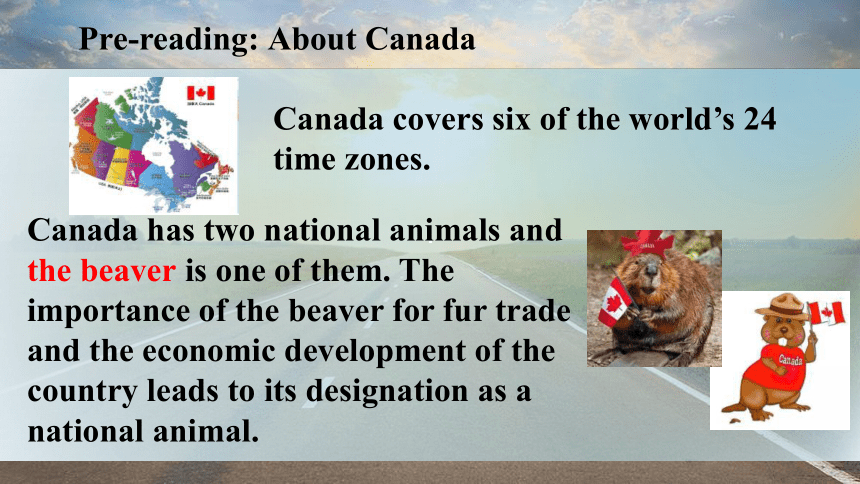
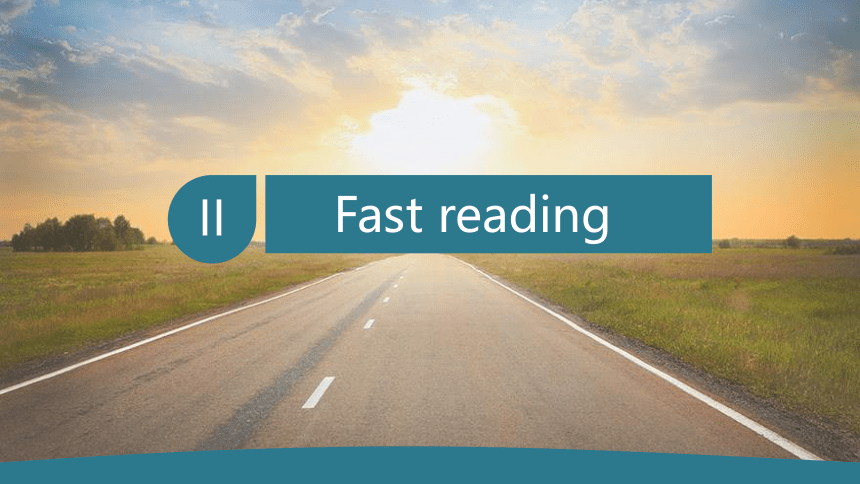
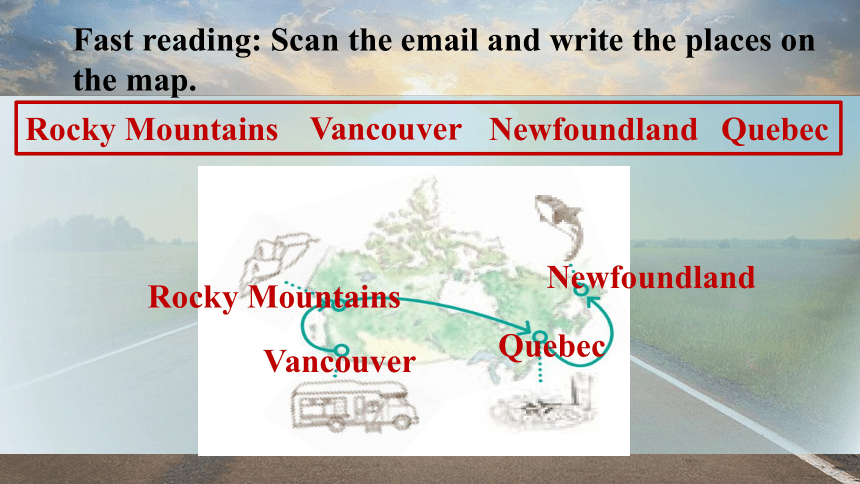
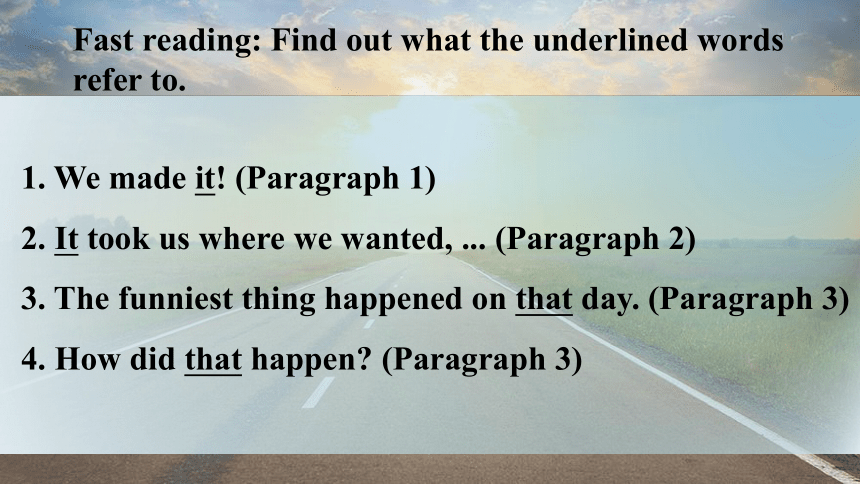
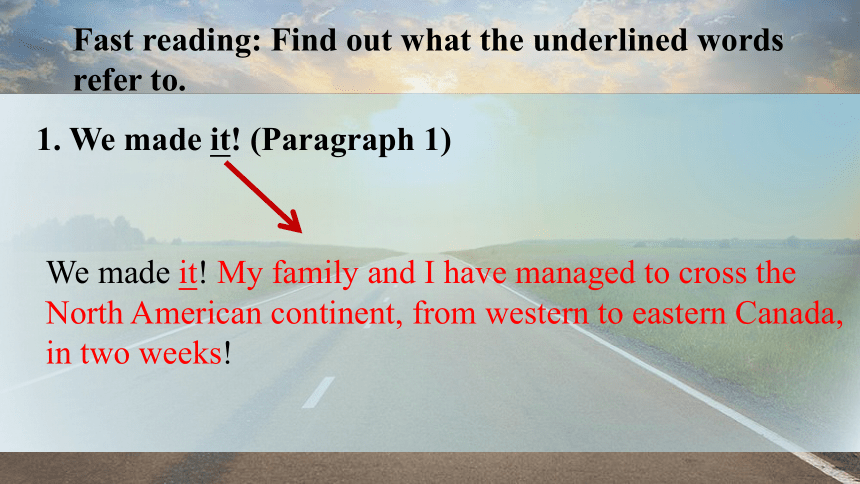
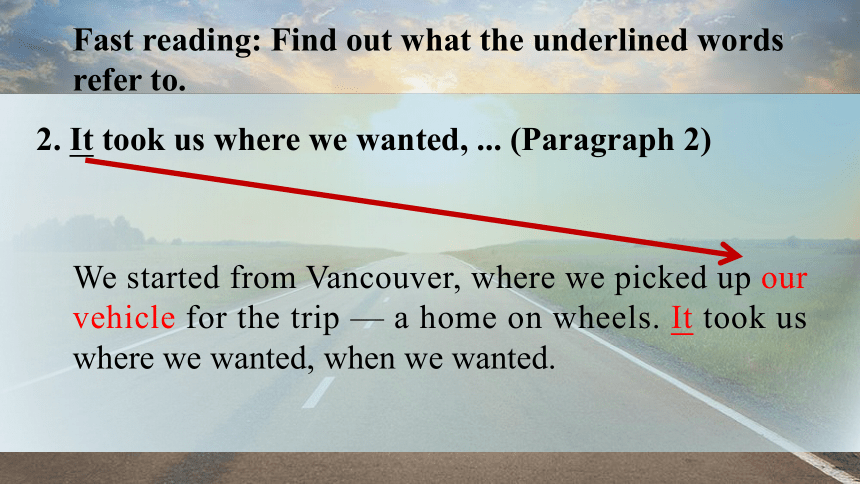
文档简介
(共35张PPT)
Developing ideas — reading
Unit 5 On the road
目录
contents
Pre-reading
I
Language points
Ⅳ
Fast reading
II
Homework
Ⅴ
Careful reading
III
Ⅵ
Post-reading
I
Pre-reading
Pre-reading: Answer the questions.
Read and answer the questions to see how much you know about Canada.
1. What is the capital of Canada
a. Toronto. b. Ottawa. c. Montreal.
2. Which is not an official language in Canada
a. French. b. English. c. Spanish.
3. What is on the Canadian national flag
a. An oak leaf. b. A maple leaf. c. A laurel leaf.
Pre-reading: Answer the questions.
Read and answer the questions to see how much you know about Canada.
4. What is the most popular sport in Canada
a. Baseball. b. Soccer. c. Ice hockey.
5. What animal is a national symbol of Canada
a. Moose. b. Beaver. c. Polar bear
Pre-reading: About Canada
Canadian flag has a red maple leaf on the red and white background.
The maple leaf is the symbol of Canada.
Canada is the second largest country in the world. It is larger than the USA and reaches nearly a quarter of the way round the earth.
Pre-reading: About Canada
Canada covers six of the world’s 24 time zones.
Canada has two national animals and the beaver is one of them. The importance of the beaver for fur trade and the economic development of the country leads to its designation as a national animal.
II
Fast reading
Fast reading: Scan the email and write the places on the map.
Vancouver
Rocky Mountains
Quebec
Newfoundland
Rocky Mountains
Vancouver
Newfoundland
Quebec
Fast reading: Find out what the underlined words refer to.
1. We made it! (Paragraph 1)
2. It took us where we wanted, ... (Paragraph 2)
3. The funniest thing happened on that day. (Paragraph 3)
4. How did that happen (Paragraph 3)
Fast reading: Find out what the underlined words refer to.
1. We made it! (Paragraph 1)
We made it! My family and I have managed to cross the North American continent, from western to eastern Canada, in two weeks!
Fast reading: Find out what the underlined words refer to.
2. It took us where we wanted, ... (Paragraph 2)
We started from Vancouver, where we picked up our vehicle for the trip — a home on wheels. It took us where we wanted, when we wanted.
Fast reading: Find out what the underlined words refer to.
3. The funniest thing happened on that day. (Paragraph 3)
We reached Quebec on the eighth day, where most people speak French. Wel1, actua11y, they speak Quebecois, which is a type of Canadian French. The funniest thing happened on that day.
Fast reading: Find out what the underlined words refer to.
4. How did that happen (Paragraph 3)
It was then that I realised her seat was empty! How did that happen
Fast reading: Find out what the underlined words refer to.
Pronouns such as “it”, “this”, “that”, “these” and “those” are used to make connections between parts of a text. These pronouns may refer to a word, a phrase or a sentence, or even several words, phrases or sentences. They can refer back to previous information or forward to new information.
Learning to learn
III
Careful reading
1. Why do you think Eva and her family chose to travel
by motor home
2. What do you think Eva enjoyed most about the trip 3. What do you think was the most memorable moment
of their trip
4. Have you ever travelled with your family Share your
experience with the class.
Careful reading: Answer the Questions
Think & Share
1. Why do you think Eva and her family chose to travel
by motor home
They chose to travel by motor home because it took them where they wanted, when they wanted.
Careful reading: Answer the Questions
Think & Share
2. What do you think Eva enjoyed most about the trip
Careful reading: Answer the Questions
Think & Share
Various answers are possible. Show your own answers.
3. What do you think was the most memorable moment
of their trip
4. Have you ever travelled with your family Share your
experience with the class.
Ⅳ
Post-reading
Work in groups. Imagine you are Eva and give a talk about your travel experience.
Post-reading: Group Work
1. Use the table to help plan your talk.
Things you enjoyed Problems you faced
2. Organise your talk following the steps below.
Say where you went and who you went with.
Share what you enjoyed about the trip.
Describe what problems you faced.
End by talking about your overall feelings about the
trip.
3. Give your talk to the class.
Post-reading: Group Work
Work in groups. Imagine you are Eva and give a talk about your travel experience.
Give your talk to the class.
Post-reading: Group Work — Presentation
Language points
Ⅴ
_____________________
_____________________
_____________________
_____________________
_____________________
_____________________
_____________________
Language points: Important Phrases
share sth with sb
a poor sense of direction
get lost
masses of
cheer sb up
the same age as
keep in touch
Find the following phrases and work out their meanings.
和某人分享某物
方向感差
迷路
大量的;许多
使高兴;使振奋
和……同岁
保持联系
Language points: Important Sentences
1. We made it!
make it 是固定搭配,意为 to be successful at something
判断下面句子中make it的含义:
1. The flight leaves in twenty minutes — we’ll never make it.
2. He never really made it as an actor.
3. I’m sorry I won’t be able to make it on Sunday.
准时到达
获得成功
能够出席 / 到场
我们成功了!
2. My family and I have managed to cross the North
American continent, from western to eastern Canada,
in two weeks!
我和我的家人在两周内成功横渡北美大陆,从加拿大西部到加拿大东部!
have managed to cross the North American continent 相当于 have succeeded in crossing the North American continent
Language points: Important Sentences
文章中包含该用法的句子还有:
… but eventually we managed to cross the Rocky Mountains. (Paragraph 2)
Language points: Important Sentences
3. We started from Vancouver, where we picked up our
vehicle for the trip — a home on wheels.
我们从温哥华出发,在那里我们取了我们旅行的车
—— 一辆房车。
本句中的 where we picked up our vehicle for the trip — a home on wheels 作为非限制性定语从句,修饰其先行词 Vancouver,所以关系副词用 where。
Language points: Important Sentences
文章中出现的非限制性定语从句还有:
① We reached Quebec on the eighth day, where most people speak French.
② Well, actually, they speak Quebecois, which is a type of Canadian French.
Language points: Important Sentences
pick up 意为 to collect something that has been left elsewhere
例句:
I’ll pick up my things later.
我过一会儿来取我的东西。
?思考:
pick up 还有哪些常用含义?
Language points: Important Sentences
4. It was then that I realised her seat was empty!
直到那时我才意识到她的座位是空的!
强调句的基本句型结构为:
It is / was + 被强调部分 + that(强调对象为物) / who(强调对象为人) + 其他成分。
Language points: Important Sentences
例句:
It was she who introduced me to the passion for studying English.
正是她使我产生了学习英语的热情。
Language points: Important Sentences
Homework
Ⅵ
Homework
1. Search the Internet to know
more about Canada;
2. Write a short passage about
your travel experience.
Developing ideas — reading
Unit 5 On the road
目录
contents
Pre-reading
I
Language points
Ⅳ
Fast reading
II
Homework
Ⅴ
Careful reading
III
Ⅵ
Post-reading
I
Pre-reading
Pre-reading: Answer the questions.
Read and answer the questions to see how much you know about Canada.
1. What is the capital of Canada
a. Toronto. b. Ottawa. c. Montreal.
2. Which is not an official language in Canada
a. French. b. English. c. Spanish.
3. What is on the Canadian national flag
a. An oak leaf. b. A maple leaf. c. A laurel leaf.
Pre-reading: Answer the questions.
Read and answer the questions to see how much you know about Canada.
4. What is the most popular sport in Canada
a. Baseball. b. Soccer. c. Ice hockey.
5. What animal is a national symbol of Canada
a. Moose. b. Beaver. c. Polar bear
Pre-reading: About Canada
Canadian flag has a red maple leaf on the red and white background.
The maple leaf is the symbol of Canada.
Canada is the second largest country in the world. It is larger than the USA and reaches nearly a quarter of the way round the earth.
Pre-reading: About Canada
Canada covers six of the world’s 24 time zones.
Canada has two national animals and the beaver is one of them. The importance of the beaver for fur trade and the economic development of the country leads to its designation as a national animal.
II
Fast reading
Fast reading: Scan the email and write the places on the map.
Vancouver
Rocky Mountains
Quebec
Newfoundland
Rocky Mountains
Vancouver
Newfoundland
Quebec
Fast reading: Find out what the underlined words refer to.
1. We made it! (Paragraph 1)
2. It took us where we wanted, ... (Paragraph 2)
3. The funniest thing happened on that day. (Paragraph 3)
4. How did that happen (Paragraph 3)
Fast reading: Find out what the underlined words refer to.
1. We made it! (Paragraph 1)
We made it! My family and I have managed to cross the North American continent, from western to eastern Canada, in two weeks!
Fast reading: Find out what the underlined words refer to.
2. It took us where we wanted, ... (Paragraph 2)
We started from Vancouver, where we picked up our vehicle for the trip — a home on wheels. It took us where we wanted, when we wanted.
Fast reading: Find out what the underlined words refer to.
3. The funniest thing happened on that day. (Paragraph 3)
We reached Quebec on the eighth day, where most people speak French. Wel1, actua11y, they speak Quebecois, which is a type of Canadian French. The funniest thing happened on that day.
Fast reading: Find out what the underlined words refer to.
4. How did that happen (Paragraph 3)
It was then that I realised her seat was empty! How did that happen
Fast reading: Find out what the underlined words refer to.
Pronouns such as “it”, “this”, “that”, “these” and “those” are used to make connections between parts of a text. These pronouns may refer to a word, a phrase or a sentence, or even several words, phrases or sentences. They can refer back to previous information or forward to new information.
Learning to learn
III
Careful reading
1. Why do you think Eva and her family chose to travel
by motor home
2. What do you think Eva enjoyed most about the trip 3. What do you think was the most memorable moment
of their trip
4. Have you ever travelled with your family Share your
experience with the class.
Careful reading: Answer the Questions
Think & Share
1. Why do you think Eva and her family chose to travel
by motor home
They chose to travel by motor home because it took them where they wanted, when they wanted.
Careful reading: Answer the Questions
Think & Share
2. What do you think Eva enjoyed most about the trip
Careful reading: Answer the Questions
Think & Share
Various answers are possible. Show your own answers.
3. What do you think was the most memorable moment
of their trip
4. Have you ever travelled with your family Share your
experience with the class.
Ⅳ
Post-reading
Work in groups. Imagine you are Eva and give a talk about your travel experience.
Post-reading: Group Work
1. Use the table to help plan your talk.
Things you enjoyed Problems you faced
2. Organise your talk following the steps below.
Say where you went and who you went with.
Share what you enjoyed about the trip.
Describe what problems you faced.
End by talking about your overall feelings about the
trip.
3. Give your talk to the class.
Post-reading: Group Work
Work in groups. Imagine you are Eva and give a talk about your travel experience.
Give your talk to the class.
Post-reading: Group Work — Presentation
Language points
Ⅴ
_____________________
_____________________
_____________________
_____________________
_____________________
_____________________
_____________________
Language points: Important Phrases
share sth with sb
a poor sense of direction
get lost
masses of
cheer sb up
the same age as
keep in touch
Find the following phrases and work out their meanings.
和某人分享某物
方向感差
迷路
大量的;许多
使高兴;使振奋
和……同岁
保持联系
Language points: Important Sentences
1. We made it!
make it 是固定搭配,意为 to be successful at something
判断下面句子中make it的含义:
1. The flight leaves in twenty minutes — we’ll never make it.
2. He never really made it as an actor.
3. I’m sorry I won’t be able to make it on Sunday.
准时到达
获得成功
能够出席 / 到场
我们成功了!
2. My family and I have managed to cross the North
American continent, from western to eastern Canada,
in two weeks!
我和我的家人在两周内成功横渡北美大陆,从加拿大西部到加拿大东部!
have managed to cross the North American continent 相当于 have succeeded in crossing the North American continent
Language points: Important Sentences
文章中包含该用法的句子还有:
… but eventually we managed to cross the Rocky Mountains. (Paragraph 2)
Language points: Important Sentences
3. We started from Vancouver, where we picked up our
vehicle for the trip — a home on wheels.
我们从温哥华出发,在那里我们取了我们旅行的车
—— 一辆房车。
本句中的 where we picked up our vehicle for the trip — a home on wheels 作为非限制性定语从句,修饰其先行词 Vancouver,所以关系副词用 where。
Language points: Important Sentences
文章中出现的非限制性定语从句还有:
① We reached Quebec on the eighth day, where most people speak French.
② Well, actually, they speak Quebecois, which is a type of Canadian French.
Language points: Important Sentences
pick up 意为 to collect something that has been left elsewhere
例句:
I’ll pick up my things later.
我过一会儿来取我的东西。
?思考:
pick up 还有哪些常用含义?
Language points: Important Sentences
4. It was then that I realised her seat was empty!
直到那时我才意识到她的座位是空的!
强调句的基本句型结构为:
It is / was + 被强调部分 + that(强调对象为物) / who(强调对象为人) + 其他成分。
Language points: Important Sentences
例句:
It was she who introduced me to the passion for studying English.
正是她使我产生了学习英语的热情。
Language points: Important Sentences
Homework
Ⅵ
Homework
1. Search the Internet to know
more about Canada;
2. Write a short passage about
your travel experience.
